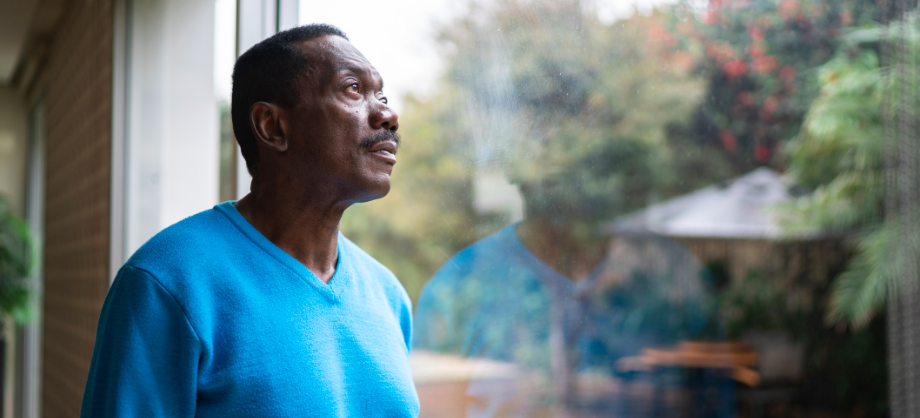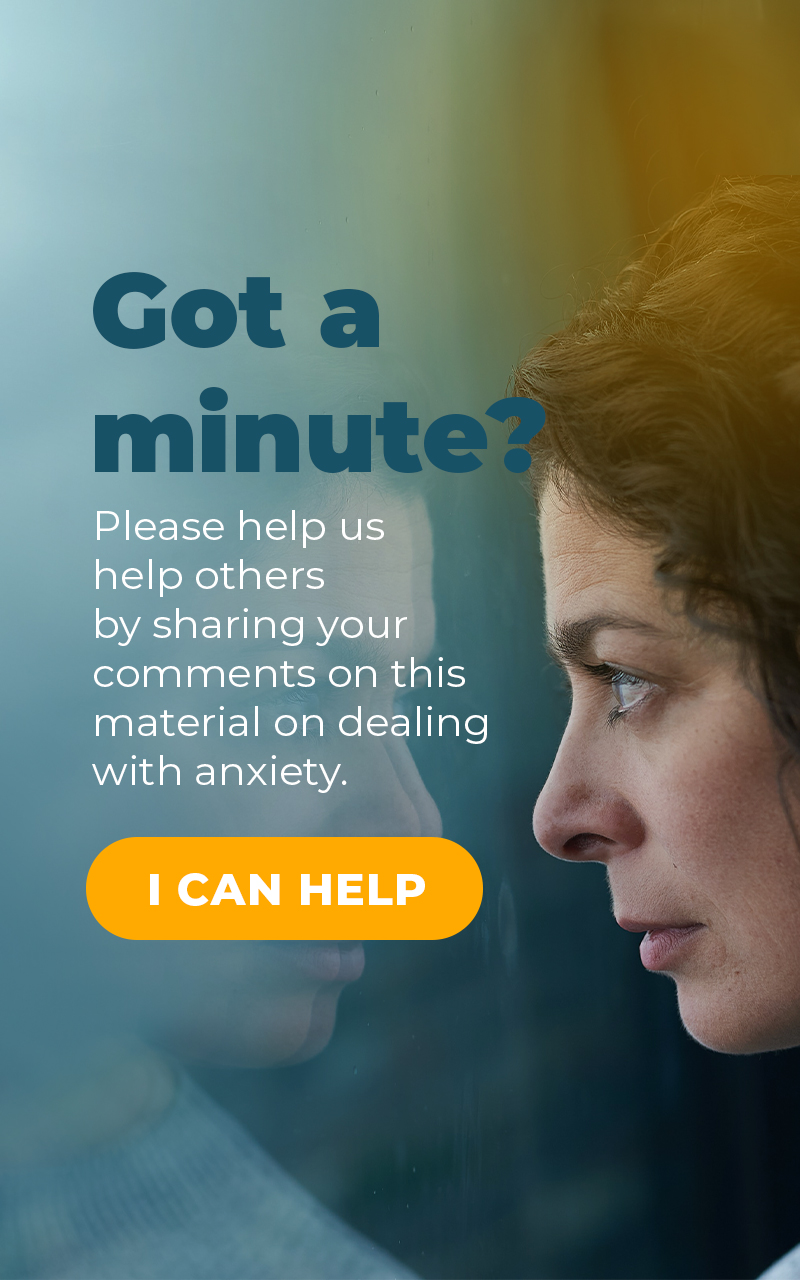Anxiety can be a good thing. Yes, you read that right. Because we can change how we think about anxiety and how we approach it, and that will change our lives for the better. These days, everyone feels stress at times, but there are things we can do to deal with anxiety better.
DEALING WITH ANXIETY
AND LIVING LIFE BETTER
There are practical steps you can take to handle anxiety effectively and enjoy life more. Starting now.
It begins by understanding anxiety is a normal part of life. You’re not different, because we all have stress. The good news is you can learn how to lessen the negative effects of anxiety and use it as an opportunity to live life better one step at a time.
The proven techniques below will show you how with steps you can take to feel less anxiety and more peace and hope.
"introduction" - how to live life better
change your life by changing how you think about and deal with anxiety.
After seeing the two short videos and article above, answer the questions below:
- From 1 (low) to 10 (high), how much better would your life be with less worry and anxiety?
- How does it help you feel better to realize we all have anxiety and it’s okay not to be okay?
- What ideas did you like most for positive steps you can take when you’re affected by anxiety?
- As next steps, are you willing to continue using the other sections of this toolkit on anxiety?
- How does accepting anxiety as a normal part of everyday life give you power over it?
- What does it mean to see anxiety as a trigger to make a positive adjustment in your life?
- How can changing negative thoughts into positive steps help reduce your stress?
- What are some specific positive steps you can take when you feel stressed, tense, or worried?
- What does it mean to learn how to deal with anxiety one step at a time?
- Which of the other listed resources (e.g., summary, talk, toolkit) are you most willing to try next?
"NOISE" - how to become more content
Ignore noise and busyness and take next right steps to live intentionally.
People are busy these days, and the noise and clutter in our lives creates anxiety. It sometimes feels like we’re running in place rather than getting anywhere. This leads to an uneasy sense of dissatisfaction unless we choose to do something about it. But there’s good news, because we can find more contentment if we focus on things that are important and ignore the rest. If we actively take things OFF our to-do list and live more purposefully one step at a time.
After seeing the two short videos and article above, answer the questions below:
- From 1 (low) to 10 (high), how much noise, distraction, and busyness do you have in your life now?
- How can it bring you more peace to focus on one thing at a time and be content with that progress?
- What areas and projects are important enough that you should consider acting on them each week?
- What are small steps you can take each week to ignore the noise and clutter and live intentionally?
- What is one project you could focus on right now, and what is one step you could take in that area?
- How does letting other things wait—and being okay with that—help you feel more content?
- What does it look like to be a good steward of your time by choosing what is right and important?
- How can you include emotional, spiritual, and personal wellness in your weekly focus areas?
- What would it mean to take something off your to-do list to reduce the clutter in your life?
- How can consistently taking small steps in the right direction help create momentum in your life?
"TENSION" - Be less tired & more resilient
Deal with tension by examining your heart and changing your perspective.
Whether we know it or not, life is pretty much how we make it out to be because our perspective is something we choose. When things happen to us, it is largely our decision how much we are affected by them for good or for bad. For example, when we face tension or change, we are being stretched, which is a good thing when it enhances our perspective. If we embrace the tension we face rather than fear it, life becomes an exciting adventure of growth and expanding horizons.
After seeing the two short videos and article above, answer the questions below:
- From 1 (low) to 10 (high), how much tension about situations or changes do you sometimes feel?
- What are ideas for good values and aspirational goals you would like to include in your worldview?
- How would it make you more resilient to choose a positive perspective whenever you feel tension?
- What are small steps you can take each week to change your perspective and improve your mindset?
- How does your personal worldview shape how you think about life and handle everyday experiences?
- What does it mean to reframe your perspective when circumstances aren’t ideal?
- How can viewing tension as an opportunity for growth help expand your horizons?
- What is your current “set point” when returning to emotional balance, and how might you adjust it?
- In what ways can choosing to be thankful each day improve your outlook on life?
- What would it look like to integrate peacefulness or optimism into your identity and daily mindset?
"WORRY" - find more peace & purpose
Release your worry by searching your soul for the wisdom to let go.
Many of us have an unconscious fixation on control that causes us to worry about things we don’t need to. One of the best ways to worry less is to loosen that obsessive behavior with a simple yet life-changing choice—to let go. Declare that the matter is not something you can change or just not worth worrying about. When the compulsion to control returns, let go again. That simple choice will bring a much greater sense of peace—both for you and the people around you.
After seeing the two short videos and article above, answer the questions below:
- From 1 (low) to 10 (high), how much would you like to worry less and have more peace in your life?
- What are things you don’t control but worry about that would give you more peace to just “let go?”
- What are things you control but procrastinate on and would like to get done and quit worrying about?
- What are small steps you can take each week to help you make wise choices so you can worry less?
- What does it mean to accept life with serenity and release the fixation on things you can’t control?
- How can summoning the courage to do the right thing actually reduce your stress?
- What areas of life do you try to control that would bring more peace if you accepted you can’t?
- How does your desire for control contribute to unnecessary worry—for you and those around you?
- What is one tough decision you’re facing where you need God’s wisdom and help to move forward?
- How can surrendering in faith help you feel less pressure to know all the answers and be strong all the time?
"STRESS" - how to make it work for you
Use stress as a positive by managing your mind to change how you think.
We all get trapped in harmful thought patterns and negative self-talk, but we can learn to manage our minds. When we do, every day becomes better. That’s encouraging!
After seeing the two short videos and article above, answer the questions below:
- From 1 (low) to 10 (high), how much stress do you feel on a normal day? On the most stressful days?
- What are situations you face that may give you stress and what are other stressors you’re aware of?
- Which of those situations might give you less stress if you “Pause, Evaluate, and Choose” what to do?
- What are small steps you can take each week to help you manage your mind and feel less stress?
- How can noticing and interrupting harmful thoughts help you limit stress?
- What does it mean to use the “power of the pause” to examine a stressful situation more clearly?
- Why does identifying a stressor often take away its control over your thinking?
- How can engaging the rational part of your mind help you better understand your stress?
- What are some healthy coping mechanisms you can choose instead of reacting impulsively to stress?
- How would it help you feel more encouraged if you trained your brain to respond more positively to stress?
"ANXIETY" - finding healing & hope
Surrender your anxiety and find strength by getting help from others.
One of the biggest misconceptions many of us have about life is believing that we have to handle everything on our own. That’s not how life really works.
After seeing the two short videos and article above, answer the questions below:
- From 1 (low) to 10 (high), how much does anxiety affect the well-being of people you care about?
- What are some areas that give you anxiety where you will try talking to someone to feel better?
- How would your life be better if you handed your anxieties to God in faith and felt his strength?
- What are small steps you can take to get help and lessen anxiety for you or people you know?
- What does it mean to admit your weakness and let go of the false pride of self-sufficiency?
- Why is it often true that the healing process begins the moment you admit you need help?
- How can sharing your burdens with someone bring relief and help you start to feel better?
- What are some helpful resources or people you can turn to when dealing with anxiety?
- How does declaring your dependence on God allow him to share his strength with you?
- What does it mean to not only live with anxiety but thrive because you have realistic assurance you can get through?
deal with anxiety and live life better
Proven steps to find more contentment, fulfillment, peace, and hope each day.






